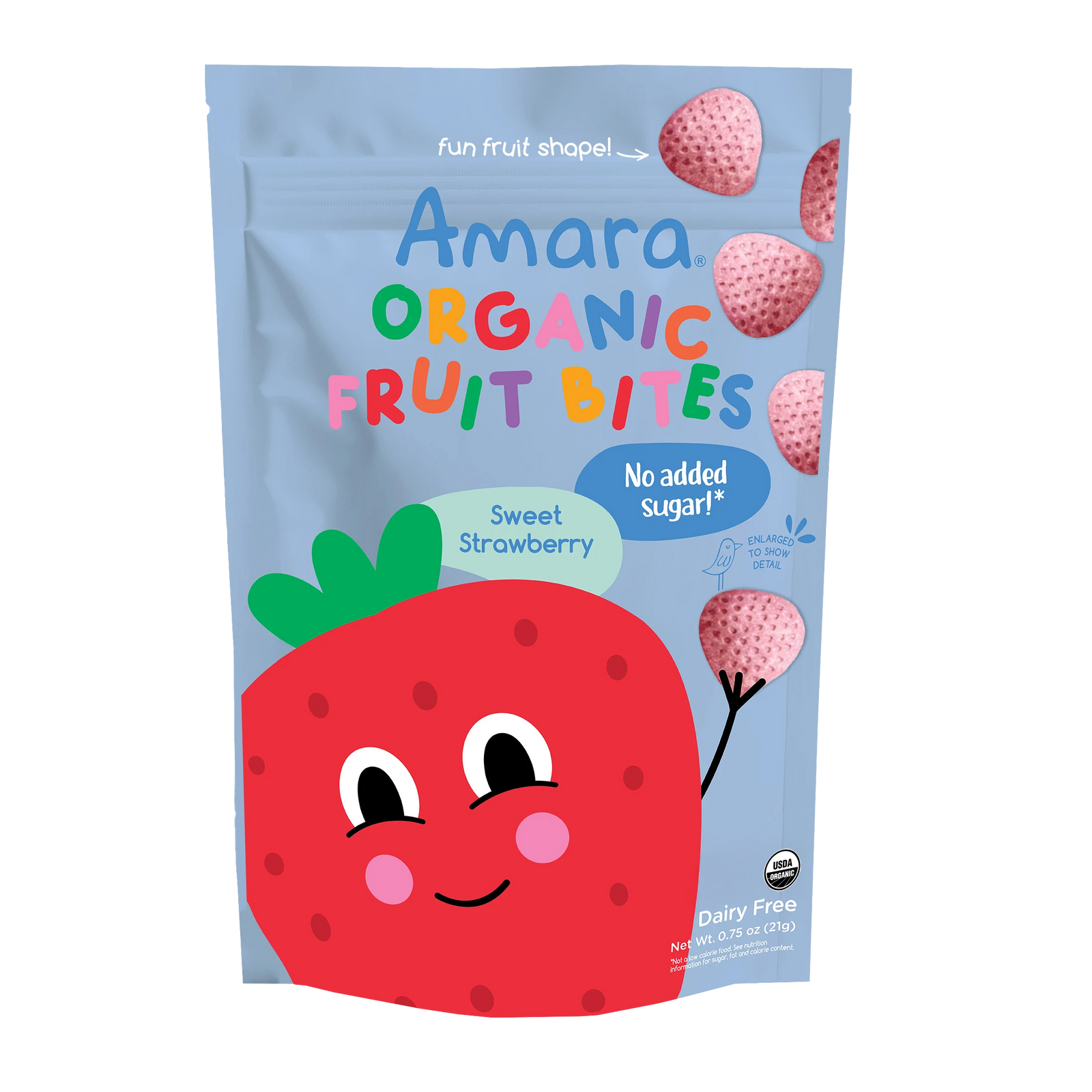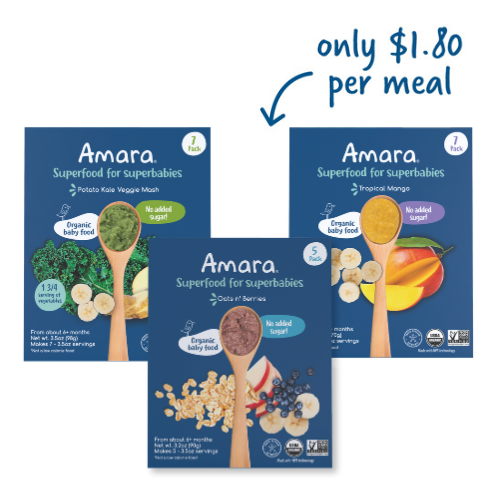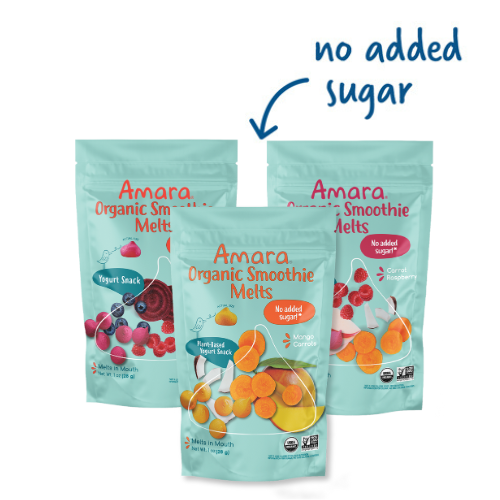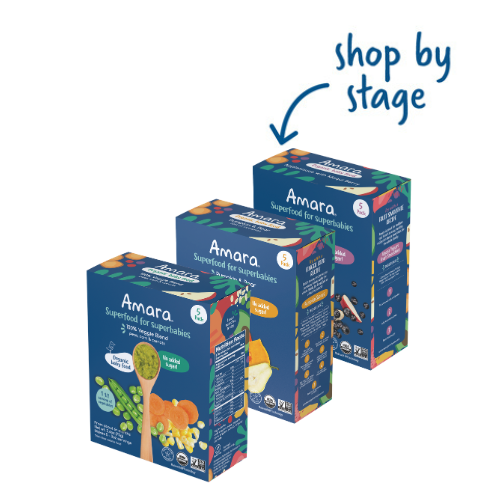 Starting Solids
Starting Solids
YOUR GO-TO GUIDE
by: Amara Organic Foods
Getting Started
First of all, Congrats!
You’ve no doubt spent many sleepless nights feeding and changed more diapers
than any human should. Now it’s time for some fun stuff. A baby starting to eat
solid food is one of the many thrilling milestones of new parenthood.There’s
nothing quite like baby’s first reaction to one of the great pleasures in life: food. As
adorable as it is, starting solids can also be a little intimidating--for parents and
baby! Is baby ready? Is she getting enough? Am I offering the right foods?
Here’s a guide to help you feel more confident, relaxed, and ready to enjoy
worry-free mealtime with baby.
Is it the Right Time?
Is baby 6 months old? The current recommendation from the World Health
Organization is to exclusively breastfeed (or give formula) for 6 months before
introducing baby to solids foods. Around this age, most infants reach a general and neurological development where they are prepared to start chewing, swallowing and digesting baby food. Many international recommendations suggest beginning solids between the ages of 4-6 months, depending on baby. Every baby is different. If you feel like your baby is ready to start solids before
6 months of age or after, it’s a good idea to reach out to your pediatrician.In addition to these guidelines and the advice of your pediatrician, here are common signs of readiness you can look for in your baby.
Readiness Signs
- Baby can sit up with minimal support
- Baby has doubled birth weight
- Baby is showing interest in the food you
- are eating
- Baby can swallow and doesn’t immediately
- spit food back out
- Baby has good head control
- Baby can close mouth around a spoon
- Baby starts bringing toys to his/her mouth
- or starts exploring everything by mouth
- Baby is swishing milk around in their
- mouth
A Note on First Foods
Now that you feel like you and baby are ready to dive in (sometimes, literally!), let’s talk first foods. It’s recommended to introduce single ingredient foods to start.
That way you can more easily identify if baby has an allergy or adverse reaction to a certain food. Naturally, vegetables, fruits, and baby cereals are ideal first foods for baby. Meat can also be introduced at 6+ months, especially for breastfed infants, where it is a good source of iron. Since a baby’s preferences begin developing from infancy, it’s important to continue to offer a wide variety of tastes, textures, and colors to baby. Remember it may take as many as 10 exposures to a new food before baby readily accepts it, so do not give up.
Continue to offer a wide array of fruits and vegetables. This is a time to instill healthy eating habits and a love of fresh, wholesome foods.
Starter Cereals & Grains
In the US, many families still begin their baby’s food journey with infant cereal. If you decide to go this route, be sure to choose an organic cereal that is specifically designed for baby, so the grains are soft and cooked, and the cereal is fortified with iron.
6+ Months
At this early stage, it’s best to steam vegetables until
soft and blend them into a fine puree. Soft, ripe fruit
can be mashed through a sieve for a smooth
consistency or blended and strained. Breast milk or
formula can also be added to the puree for an easier
transition to solids.
Expect baby to take 1-2 spoonfuls and be done or play
with the food. Exploration is a key part of starting
solids at this stage. Continue to breastfeed or offer
formula continuously and do not introduce juice or
cow’s milk to baby’s diet.
Starter Vegetables & Fruits:
- Peas
- Sweet Potato
- Carrot
- Potato
- Pumpkin
- Parsnip
- Banana
- Mango
- Avocado
- Pears
- Peaches
- Apple
8+ Months:
Foods to Avoid and Fruits to Try:
Highly Processed At this next stage, your baby’s appetite for solid foods may be gradually increasing, and you can continue to offer more solid foods accordingly. Also, baby can begin to handle more texture at this point, so your baby’s food can be slightly chunkier than a very fine, strained puree.
Avoid!
- Fried foods
- Salt
- White Rice Cereal
- Sugar
- Honey (0-12 months)
In addition to fruits, vegetables and baby cereal, many families begin to introduce more protein and iron-rich foods at this stage in the form of cooked and pureed beans, legumes, meats and low-mercury fishes.
*Pro Tip
Try adding a teaspoon of an organic cold-pressed oil, such as olive or rapeseed, for a healthy dose of fat.
Plant-Based Proteins
Edamame
Black Beans
Chickpeas
Lentils
Tofu
Split Peas
10-12 Months Finger Food Check
Time to check for finger foods! Does your baby do this?
- Pinch things with their fingers
- Put everything into their mouth
- Make chewing motions
- Have the ability to move things from one hand to another
10 + Months 12 + Months
Finger Food Ready? Time to Try:
- Small chunks of soft fruits or cooked vegetables
- Cooked beans and legumes (roughly smashed)
- Strips of whole grain toast (plain or with grass-fed butter, cream cheese)
- Small cubes of cooked chicken or cubed tofu
- Pieces of dry, unsweetened whole grain cereal
- Prepared finger foods
Keep trying new vegetables!
More suggestions: Asparagus, Broccoli, Beets, Brussel Sprouts, Mushrooms, Eggplant
Almost Ready for Solid Food All the Time!
Here are some signs to look for:
- Baby swallows food easily
- Baby no longer pushes food out
- their mouth
- Baby is growing teeth
- Baby wants to use a spoon
Yay! Baby is ready to participate in family meal time.
1.Combination Foods - Bean and Cheese
Quesadillas, Veggie Burgers
2.Firmer Fruits - Small chunks or slices of
pineapple, watermelon, Asian pear, melon
or slices of bell peppers, cucumber, grape
3. Raw, Crunchy Vegetables - Small chunks
tomatoes, jicama
Liquids
Breast milk or formula provides all of the hydration a baby requires up until 6 months. After 6 months, babies can be given small sips of water, but not in large volumes because they can “fill up” on water instead of continuing to breastfeed or take in formula.
Water can be steadily increased and offered as baby weans.
Cow’s milk should not be given until after 12 months.
Juice (even 100% fruit juice), fruit concentrate or any sugary drink should not be given to baby during their first year, and continued to only be given as a rare exception through childhood as studies show juice intake can lead to obesity, diabetes, poor dental health and creates a preference for very sweet foods.
How much and How often?
After introducing solids, start with offering once a day and then begin to increase servings until you are serving baby three meals a day.
Let your baby and your own instincts help guide the way.
An easy way to monitor the number of solid servings your baby is getting is to give baby solids at family mealtimes.
This also encourages a healthy attitude towards eating and reduces mealtime power struggles.
By their first birthday, your infant should be on a regular schedule of eating solids that include the following servings daily:
- Fruit: 1-2 servings
- Vegetables: 2-4 servings
- Grains (or starchy vegetables): 3-6 servings
- Meats, Poultry, Fish or Egg (or high iron substitute): 1 serving
- Dairy (full-fat for children under 2): 2 servings
- Fat: 15g / day (butter and/or cold-pressed oil)

Establishing a Feeding Schedule
Routine is important to everyone’s day-to-day life. Most people have set times for when they eat, go to bed and go to work. When it comes to a baby’s basic needs, it is important to establish routine fairly early on. Even though your child’s brain is still developing, it will learn when to expect certain things, such as when food is coming.
Why?
When your baby seems ready, you should attempt to begin a feeding schedule. Creating predictable eating times in the day can help baby with sleep and transitions. For example, an established feeding schedule can smooth the transition to sitter or day care. It will also help because at the same time, you will be creating sleep and play schedules. All of these rhythms will help reinforce one another.
When?
At around the two to four month mark, you want to try to get your baby on a regular feeding schedule. Before you get to this point, you should keep track of when your baby seems hungry naturally. Take notes, and incorporate this information into the emerging routine. For example, if your baby usually gets hungry at around 1 p.m. naturally, then you could elect to feed at that time in your schedule.
Staying Flexible
After a few months, it is acceptable to get a little more predictable when it comes to when the baby gets fed and goes to bed. However, it is vital to still be lenient. If your baby is hungry, then you would not want to withhold food for the sole purpose of adhering to the schedule. All babies are different, and yours may need more time to stick to a schedule.
Introducing solids is a fun and challenging time for most parents,
especially if it is your first child. At AmaraOrganic Foods, we offer an
introduction to solids that includes age-appropriate, nutrient-dense fruits
and vegetables to take the guesswork out of your baby’s first foods.
Homemade, Made Possible
amaraorganicfoods.com


 Starting Solids
Starting Solids






Leave A Comment